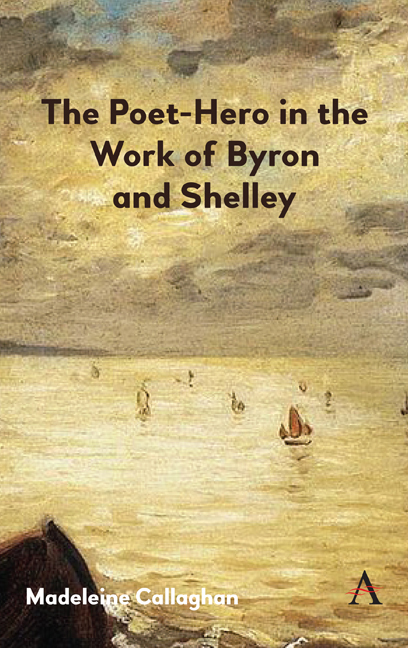Book contents
- Frontmatter
- Dedication
- Contents
- Acknowledgements
- Note on Texts and Abbreviations
- Introduction: The Poet-Hero: ‘Who shall trace the void?’
- Part I Byron
- Chapter One ‘A tyrant-spell’: The Byronic (Poet-)Hero in Manfred, Childe Harold's Pilgrimage and Beppo
- Chapter Two ‘Degraded to a Doge’: Inappropriate Poetic Heroism in Marino Faliero
- Chapter Three ‘Thoughts unspeakable’: Poetic Heroism under Pressure in Cain and The Deformed Transformed
- Chapter Four Poetic Heroism and Authority: Don Juan and ‘Epistle to Augusta’
- Interchapter
- Part II Shelley
- Conclusion The Byronic and the Shelleyan Poet-Hero
- Bibliography
- Index
Chapter Two - ‘Degraded to a Doge’: Inappropriate Poetic Heroism in Marino Faliero
from Part I - Byron
Published online by Cambridge University Press: 30 March 2019
- Frontmatter
- Dedication
- Contents
- Acknowledgements
- Note on Texts and Abbreviations
- Introduction: The Poet-Hero: ‘Who shall trace the void?’
- Part I Byron
- Chapter One ‘A tyrant-spell’: The Byronic (Poet-)Hero in Manfred, Childe Harold's Pilgrimage and Beppo
- Chapter Two ‘Degraded to a Doge’: Inappropriate Poetic Heroism in Marino Faliero
- Chapter Three ‘Thoughts unspeakable’: Poetic Heroism under Pressure in Cain and The Deformed Transformed
- Chapter Four Poetic Heroism and Authority: Don Juan and ‘Epistle to Augusta’
- Interchapter
- Part II Shelley
- Conclusion The Byronic and the Shelleyan Poet-Hero
- Bibliography
- Index
Summary
Marino Faliero, the first of Byron's ‘experimental plays’, shows him interrogate the place of heroism in society. Language becomes the primary site of conflict as Byron's emphasis falls on the poet-hero. Like William Hazlitt, Byron saw that ‘the language of poetry naturally fall[s] in with the language of power’, and Byron's insight is to test the use and abuse of language, forcing all language, whether political, personal or poetical, to take centre-stage as the site of power struggle. Poetic heroism, refracted through the prism of Byron's ambitious ‘mental theatre’ (BLJ 8: 187), is explored primarily through the problem of words. L. E. Marshall succinctly sums up Byron's career-long preoccupation with the relationship between word and thing: ‘Byron's poetic ambition, put very simply, was to call things by their right names.’ Byron's sense of language as perverted by the empty mouthing of fashionable shibboleths was a driving force in his later poetry and drama as he sought to expose the bankruptcy of this mode of language use. Faliero becomes a poet-hero by virtue of his faith in language, but it is a form of poetic heroism left carefully open to criticism. Faliero's drive to connect word and thing renders him a difficult version of ‘the new Promethean poet’. From Steno's scrawl, and Faliero's rage against his title, to Angiolina's refusal to countenance the significance of words, language's power comes under scrutiny throughout Marino Faliero. Political authority is created and maintained by the patricians’ power over language, as they ‘rule us with a word / As with a spell’ (Marino Faliero 2. 2. 118– 19). Poetic heroism, signified by command over language and the struggle against cant, becomes the centre and circumference of the play.
Fighting against the enchantment of cant, Faliero's implacable drive to unite ‘Doge’, ‘a worthless by-word’ (1. 2. 100) with his conception of its meaning, forces the tragedy to its climax. Faliero is a vital member of Byron's created community of alienated patrician heroes as the fraught relationship between language and selfhood provides the dramatic tension of the play. Faliero's tensely conflicted alliance with the plebeian movement renders poetic heroism contextual, open to challenge and criticism, by its carefully ambiguous cause.
- Type
- Chapter
- Information
- The Poet-Hero in the Work of Byron and Shelley , pp. 39 - 56Publisher: Anthem PressPrint publication year: 2019



